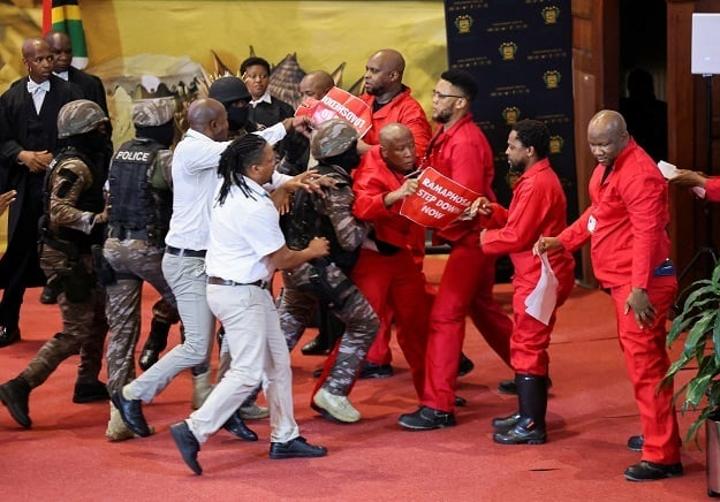Africa-Press – South-Africa. EFF MPs, who stormed the stage during the State of the Nation Address (SONA) in February, caused serious disruption and had the potential to cause violence.
This according to National Assembly Speaker Nosiviwe Mapisa-Nqakula in her report, published by Parliament on Tuesday, on the 9 February incident.
EFF MPs stormed the stage where Ramaphosa was sitting during SONA. The party had prevented the president from speaking for more than 30 minutes at the start of his speech and was eventually ordered to leave.
As they made their way out of the chamber, chaos erupted, and EFF MPs were forcibly removed by heavily armed police and parliamentary protection services officers when they rushed onto the stage towards the president.
After the acting Serjeant-at-Arms reported the members would not comply, Mapisa-Nqakula ordered them to be removed by Parliamentary Protection Services.
She made it clear female EFF MPs should only be removed by female protection services officers.
“A large number of members of the Economic Freedom Fighters then stood up, and engaged in disruptive and disorderly conduct, holding placards, resisting attempts to be removed from the chamber and proceeded to climb onto the stage, and making approaches towards the president where he was seated waiting to deliver his address,” Mapisa-Nqakula said in her report.
At the time, EFF leader Julius Malema, his deputy, Floyd Shivambu, and MPs Vuyani Pambo, Marshall Dlamini, Mbuyiseni Ndlozi and Sinawo Tambo were observed on the stage.
“Owing to what the speaker considered to be an escalating situation with a reasonable prospect of violence and serious disruptions as a result of members resisting being removed, the unprecedented manner in which members, in defiance of an order to leave the chamber, stormed the stage and the general grave disorder in the chamber, the speaker suspended proceedings.
“Other members of the Economic Freedom Fighters, holding up placards, also then congregated at the base of the stage and seemed to be attempting to join their fellow members who were at that point already on the stage.
“These members were also duly removed,” she added.
Regarding the rules used to remove the rowdy EFF MPs, Mapisa-Nqakula pointed to several provisions.
“Joint Rule 14G prescribes that if the presiding officer is of the opinion that a member is deliberately contravening a provision of these Rules, or that a member is in contempt of or is disregarding the authority of the chair, or that a member’s conduct is grossly disorderly, he or she may order the member to withdraw immediately from the chamber for the remainder of the sitting,” she said.
If a member refuses to leave the chamber when ordered to do so by the presiding officer in terms of Joint Rule 14G, the presiding officer must instruct the Serjeant-at-Arms or the usher to remove the member from the chamber and the precincts of Parliament forthwith.
“Rule 14GA[2[ further provides that if the Serjeant-at-Arms or the usher is unable in person to effect the removal of the member, the presiding officer may call upon the Parliamentary Protection Services to assist in removing the member from the chamber and the precincts of Parliament.
“Rule 14GA[5] provides that if a member resists attempts to be removed from the chamber in terms of sub-rules [1] or [2], the Serjeant-at-Arms, the usher and the Parliamentary Protection Services may use such force as may be reasonably necessary,” Mapisa-Nqakula said.
For More News And Analysis About South-Africa Follow Africa-Press






